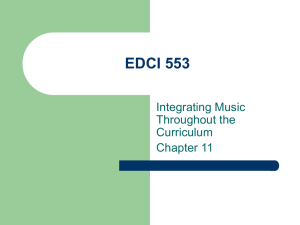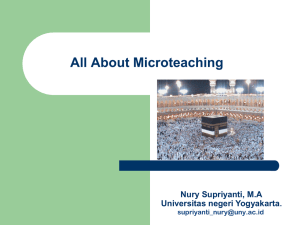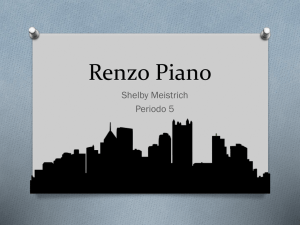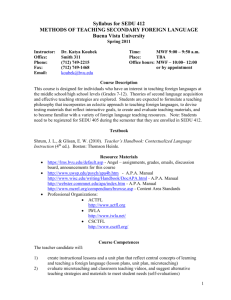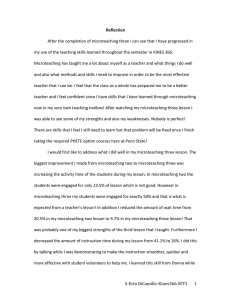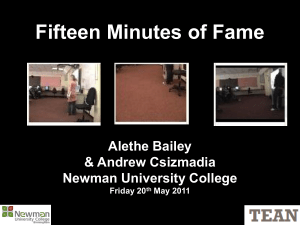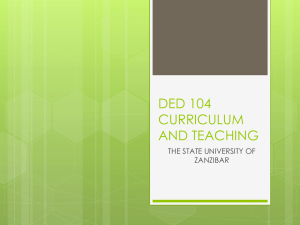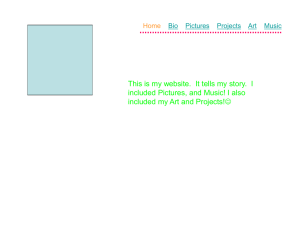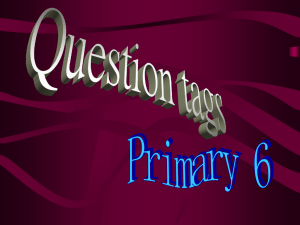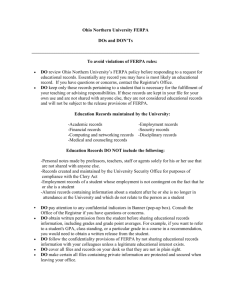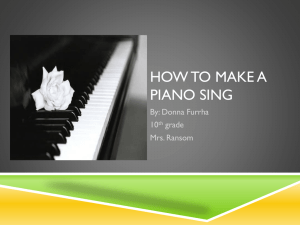MUS 20003 Music in the Curriculum
advertisement
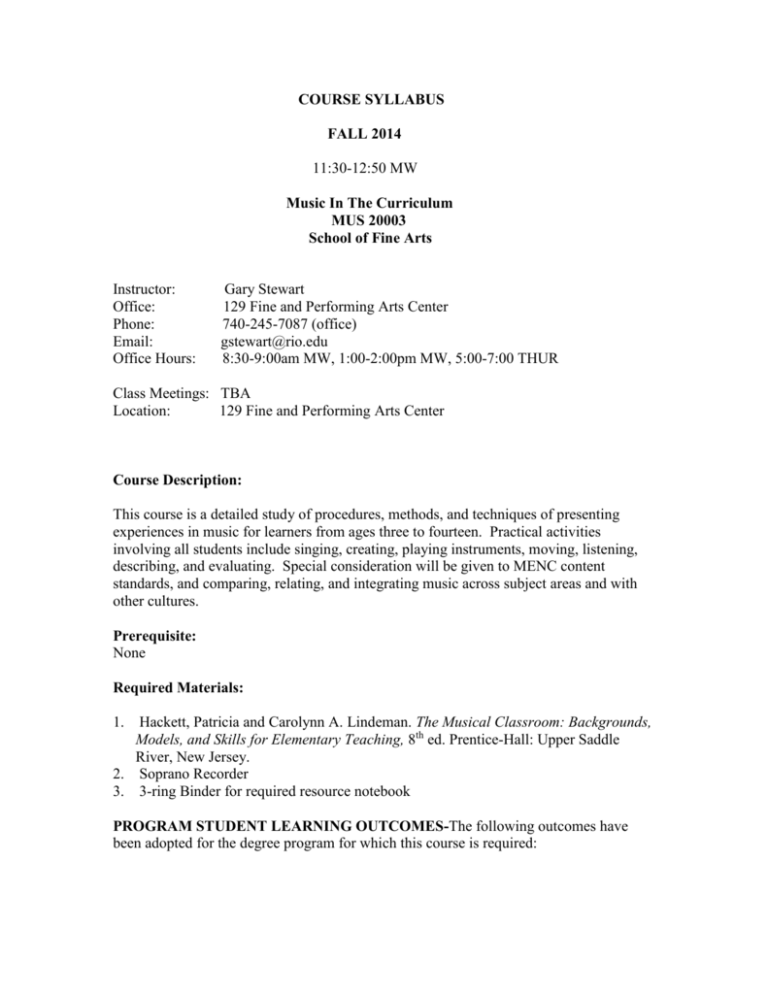
COURSE SYLLABUS FALL 2014 11:30-12:50 MW Music In The Curriculum MUS 20003 School of Fine Arts Instructor: Office: Phone: Email: Office Hours: Gary Stewart 129 Fine and Performing Arts Center 740-245-7087 (office) gstewart@rio.edu 8:30-9:00am MW, 1:00-2:00pm MW, 5:00-7:00 THUR Class Meetings: TBA Location: 129 Fine and Performing Arts Center Course Description: This course is a detailed study of procedures, methods, and techniques of presenting experiences in music for learners from ages three to fourteen. Practical activities involving all students include singing, creating, playing instruments, moving, listening, describing, and evaluating. Special consideration will be given to MENC content standards, and comparing, relating, and integrating music across subject areas and with other cultures. Prerequisite: None Required Materials: 1. Hackett, Patricia and Carolynn A. Lindeman. The Musical Classroom: Backgrounds, Models, and Skills for Elementary Teaching, 8th ed. Prentice-Hall: Upper Saddle River, New Jersey. 2. Soprano Recorder 3. 3-ring Binder for required resource notebook PROGRAM STUDENT LEARNING OUTCOMES-The following outcomes have been adopted for the degree program for which this course is required: 1. Demonstrate comprehensive capabilities in their major performing area, including the ability to work independently to prepare performances at a level appropriate to their concentration. 2. Demonstrate their understanding of the common elements of music including rhythm, melody, harmony, musical forms and organizational patterns. 3. Demonstrate a basic knowledge of music history through to the present time. 4. Use technology to document their accomplishments as a musician throughout their college career, and prepare a professional electronic portfolio. 5. Demonstrate growth in their major performing area every semester of attendance. 6. Perform both solo and ensemble literature in a public concert. 7. Demonstrate a basic knowledge of piano performance including the ability to play major and minor scales, perform a short solo piece, read from 4-part music, harmonize a simple melody at sight, perform a simple accompaniment, perform simple songs. Course Goals and Objectives: Through a variety of in-class activities and outside assignments, the students will demonstrate proficiency in the following areas: Knowledge: As a student, you will demonstrate knowledge 1. of philosophies upon which current music methods are based, including those promoted by Kodaly, Orff, and Dalcroze, and integration of those philosophies as needed for the classroom. 2. of basic concepts of vocal production for children pre-school through grade 9. 3. in developing a music curriculum appropriate for pre-school through grade 9. 4. in planning music activities for all children, including children with special needs. 5. 6. 7. of materials that may be used in planning music activities such as children’s literature, singing games, folk songs, recordings, and technology. in selecting music and planning music lessons appropriate for elementary students. of the National Standards in Music Education. Skills: As the student, you will demonstrate skill in 1. 2. 3. 4. 5. singing with a class and leading classroom singing. playing at a functional level the instruments for elementary classroom including the recorder, guitar, piano, and Orff instruments. leading children in expressive movement, patterned movement, action songs and singing games. utilizing music to teach other subjects such as language arts, math, social science, art, etc. utilizing music to create a positive atmosphere and to assist in behavior management in the classroom. Dispositions: As a student, you will gain as awareness of 1. 2. the potential of music to significantly improve the quality of our lives. the importance of music for all children and the vital role it plays in their development. 3. your own musical growth and creativity. Course Requirements: Grades are based on successful completion of the following: 1. 2. 3. 4. 5. 6. 7. Complete readings out of The Musical Classroom as assigned for class discussion. Other readings will be assigned as the class progresses. Attendance at and participation in each class session. Lesson Plans: Each student will prepare three (3) lesson plans at the level of their licensure: For Early Childhood licensure, two (2) lesson plans at Level 1 (pre-school through first grade), and one (1) at Level 2 (second through third grades). For Middle Childhood licensure, two (2) lesson plans at Level 3 (fourth through sixth grades), and one (1) at Level 4 (seventh through ninth grades). During the course of the semester the student should include teaching an unaccompanied song by rote and a song with accompaniment (guitar, piano). The student may use recorded accompaniments but must accompany themselves at least once during a lesson. Each student must provide a copy of each lesson plan for the instructor and every class member. Microteachings: Each student will teach a lesson using the above lesson plans. Each of the lessons will be videotaped for viewing and evaluation. Self-Evaluation: For each microteaching, observe the videotaped lesson and complete a Self-Evaluation form, due three class days after the teaching experience (if you teach on Monday the form is due the following Monday). Materials File: Each student will prepare a resource file containing: a) collections of songs, chants, etc., b) records, tapes, cd’s c) bibliographic information of books about music for children, methods texts, and teaching aids, d) summaries of readings, 5) lesson plans and materials, 6) other materials. Musical Competencies: Throughout the semester, each student will be expected to demonstrate the following, either in the context of the micro-teaching, in class, or in private meetings with the instructor; A. ability to lead an unaccompanied song, giving pitch and tempo properly, B. ability to accompany songs using piano and guitar (at least two keys required), C. ability to play the soprano recorder with good intonation, tone quality, and accurate fingerings in prepared repertoire. 8. Article Reviews: Read and summarize 4 articles selected from The Instrumentalist, The Choral Journal, The Music Educators Journal, (some articles available online via OhioLINK) or another journal related to music education. Each article should be at least 1 page, typed, and double-spaced. You should include at the end of each review a few thoughts of your own regarding the article and how you might apple the information to your subject. Copies of the reviews should be made for each member of the class. Be prepared to share your thoughts regarding the article with the rest of the class on the day each review is due. 9. Completion of the final project (information on this will be announced). Students will earn points as follows for each of the above competencies: 1. Lesson Plans (3): 25 points each for a total of 75 points 2. Micro-Teachings (3): 50 points each for a total of 150 points 3. Self-Evaluations (3): 25 points each for a total of 75 points 4. 150 points 5. Musical Competencies (3): 50 points each for a total of (Piano, Guitar, and Recorder) Final Project (1): 150 points for a total of 150 points 6. Materials File (1): 200 points for a total of 200 points 7. Article Reviews (4): 25 points each for a total of 100 points 8. Attendance 100 points Total possible 1000 points Final grade is based on this scale: 920-1000 830-919 740-829 650-739 0-649 A B C D F Attendance and Participation Policy: Attendance, punctuality, and participation in class discussions and activities are expected of each student. Students should miss no more than three classes for any reason (including illness). Three tardies count as one absence. It would be impossible to receive an “A” final grade if you have more than three absences and/or are frequently tardy, even though you might rate superior in all other aspects. A student will fail the class because of poor attendance and excessive tardiness. The instructor reserves the right to raise a course grade in exceptional circumstances. ADA Statement: If a student wishes to be identified as having a physical, mental, or learning disability that may require accommodation, he/she must register with the Office of Accessibility, located in the Department of Health Services, prior to the end of the first week of classes for each semester. These registered students must identify themselves to their instructors and provide them with a copy of a letter from the Accessibility Office that identifies appropriate accommodations at the first class meeting and no later than the end of the first week of class for each semester. FERPA: The University of Rio Grande and Rio Grande Community College are committed to fully respecting and protecting the rights of students under the Family Educational Rights and Privacy Act (FERPA). These rights generally include the right to inspect, review and seek amendment to the student’s education records and the right to provide written consent before personally identifiable information from education records is disclosed. Under FERPA, students have the right to file a complaint with the US Department of Education concerning alleged failures to comply with FERPA, Please see the Student Records Confidentiality/Rights Under FERPA section of the Student Handbook for details and more information. Tentative Course Calendar: Week 1 Course introduction, syllabus, Chapter 1: Music in the Elementary School Chapter 2: Introduction to the Elements of Music and Music Concepts Voice, pp. 273-75 Music-Making Activities: Singing, pp. 32-39 Week 2 Continue Chapter 2: Level 1: Model Experiences for Kindergarten and 1st Grades, pp. 111-51 Voice, continued Music-Making Activities: Singing, continued Article Review #1 due Week 3 Level 1 continued Recorder, pp. 267-72 Music Making Activities: Movement, pp.41-44 Microteaching #1: Lesson Plan due Week 4 Level 1 continued Recorder, continued Microteaching #1: Level 1 (pre-school- 1st grade) 4 Week 5 Level 2: Model Experience for 2nd-3rd grades, pp. 153-91 Music-Making Activities: Creating Music, pp.44-46 Recorder, continued Microteaching #1: Self-Observation due Article Review #2 due Week 6 Level 2, continued Piano, pp. 255-66 Music-Making Activities: Reading and Notating Music, pp. 47-49 Microteaching #2: Lesson Plan due Week 7 Level 2, continued Piano, continued Microteaching #2: Level 2 (2nd-3rd grades) Week 8 Level 3: Model Experience for 4th-6th grades, pp. 197-236 Piano, continued Approaches to Curriculum, pp. 64-78 Microteaching #2: Self-observation due Article Review #3 due Week 9 Level 3, continued Piano, continued Approaches to Curriculum, continued Microteaching #3: Lesson Plan due Week 10 Level 3, continued Piano, continued Microteaching #3: Level 3 (4th-6th grades) Week 11 Planning and Assessing Music Learning, pp. 101-08 Guitar, pp. 248-54 Microteaching #3: Lesson Plan due Article Review #4 due Week 12 Integrating Music with other Subjects and Activities, pp. 427-28 Guitar, continued Microteaching #4: Lesson Plan due Week 13 Integrating Music, continued Guitar, continued Microteaching #4: Student Choice 5 Week 14 Curriculum Developments, pp. 80-97 Music Resources, pp. 425-40, including Addresses and Web sites, Jazz, Kodaly, Approach, Movement, World Music, Orff-Schulwerk, Music Software, Singing, and Western Art Music. Microteaching #4: Self-Observation due Materials File due Week 15 Final Project due Playing Exams (if needed) Review and Catch-up 6
